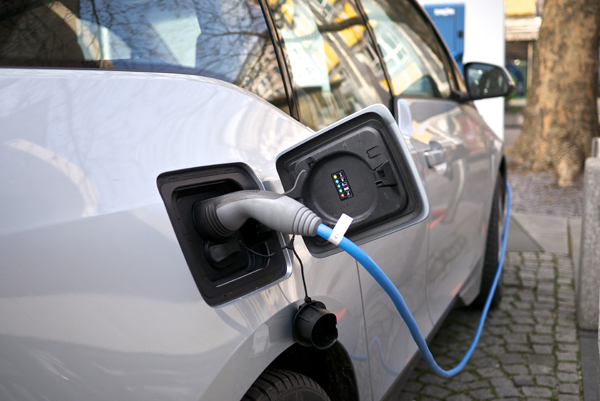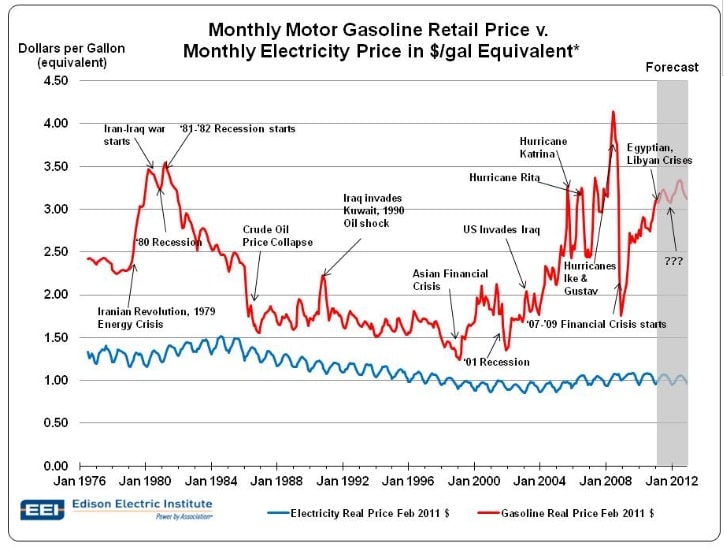Driving electric is a resilient transportation option that provides benefits to consumers, enhances energy security, and stimulates economic development. The auto industry has ground to a temporary halt; when it inevitably re-emerges it would be wise to reorganize financial and human resources to focus on electrifying the American automobile fleet as quickly as possible as part of a larger recovery strategy.
Stan Cross | April 3, 2020 | Clean Transportation, Electric VehiclesWe have entered a time of economic uncertainty. Federal policymakers are unleashing a series of stimulus packages to keep the economy afloat. State and local officials are trying to keep communities safe from the global Covid-19 pandemic. Many Americans are losing income and wealth. How the pandemic will impact the American economy in the near term is unclear. What is clear is that every sector will face challenges, including the auto industry.

For a sense of potential American auto industry impact, look to Asia. There, year-over-year auto sales dropped 44% in China and 18% in South Korea in January and February as Covid-19 cases peaked, and the governments implemented stay-at-home policies. Meanwhile, in America, automakers are temporarily shutting down production facilities to slow the spread of Corvid-19, repurposing assembly lines to produce ventilators, and preparing for industry-wide declining sales that will impact electric vehicle (EV) sales as well. But EVs have substantial advantages that could result in sales bouncing back faster than gas-powered cars and trucks and better support long-term industry viability and consumer needs:
- EVs are 2.3 times cheaper to operate than gas-powered vehicles, and, therefore, lower consumers’ overall transportation costs. This is true for households as well as government and corporate fleets.
- America’s regulated electricity sector is not prone to the volatility and geopolitical instability that plagues the oil market.
- The auto industry and governments across the world are poised to invest hundreds of billions of dollars in EVs, much of which will grow American manufacturing capabilities providing needed jobs across the country.
The consumer, energy security, and economic development benefits of electric transportation add up to make EVs resilient, especially in uncertain times. As policymakers continue to craft and release stimulus packages to help workers and industries rebound, auto manufacturers would be wise to implement recovery strategies to accelerate the EV market, focusing financial and human resources on electrifying the American automobile fleet as quickly as possible.
Driving on Electricity vs. Driving on Oil
Electric vehicles run on low-cost and price-stable electricity, making them energy-secure, money-saving transportation options.
The oil industry is unregulated and operates in a volatile global market
In early March, halfway across the world, Saudi Arabia and Russia escalated their battle for global oil market share by flooding the market and slashing prices. In America, oil futures had their steepest fall since 1991, plummeting 25%, while treasury yields hit record lows just as the economic strains of the pandemic began to impact the market. Because 69% of America’s oil use goes to fuel transportation, automobile drivers are vulnerable to this volatility. While dramatic declines in the cost of gasoline may benefit consumers in the near term, such volatility means that significant price spikes occur as well.

The electricity industry, on the other hand, is regulated and operates in a stable domestic market
Prices do not fluctuate wildly and have remained relatively stable for decades. States task utility regulatory bodies to protect consumers from unreasonable price hikes; and in many states, consumers and advocates like SACE have the opportunity to weigh in on utility decisions like price increases, whereas the oil industry lacks this type of entree. Currently, regulators across the country are working with utilities to ensure consumers’ power will not be disconnected due to non-payment during the pandemic. Because EVs run on electricity, EV drivers benefit directly from these consumer protections.
In the current economic crisis, if you own a car and suddenly cannot afford gas, you are stuck. If you own an EV and cannot afford electricity, your utility will likely continue to provide power to keep you moving.
The auto industry is already deeply invested in electrifying transportation
Auto manufacturers have spent billions of dollars to develop the EV supply chain and build manufacturing facilities. The result has been the production of a growing line of models that are price-competitive with traditional cars and trucks and have 200+-mile electric ranges. The auto industry and global governments determined to reduce greenhouse gas emissions are poised to invest over $300 billion globally over the next 5-10 years to electrify transportation for the masses.
Take, for example, Volkswagen Group member Audi’s announcement this week that despite the global impacts of Covid-19, it remains committed to having 30 electrified vehicle models for sale and building 800,000 EVs annually by 2025.
As America experiences the Covid-19 pandemic human health crisis and the related economic crisis, industries and markets will be tested. As taxpayer dollars are released in waves of stimulus packages, the auto manufacturing industry would be wise to use this moment to leverage the resilient benefits of EVs fully and accelerate their deployment, doing so in a manner that creates jobs and delivers consumers a lower cost and more stable transportation alternative quickly. Focusing recovery efforts on EV market expansion will pay dividends for automakers, consumers, and the American economy.
The Southern Alliance for Clean Energy’s Electrify the South campaign educates and empowers individuals, communities, municipalities, policymakers, and utilities to transition to clean, electric transportation throughout the Southeast. Visit Electrify the South.org to learn more.